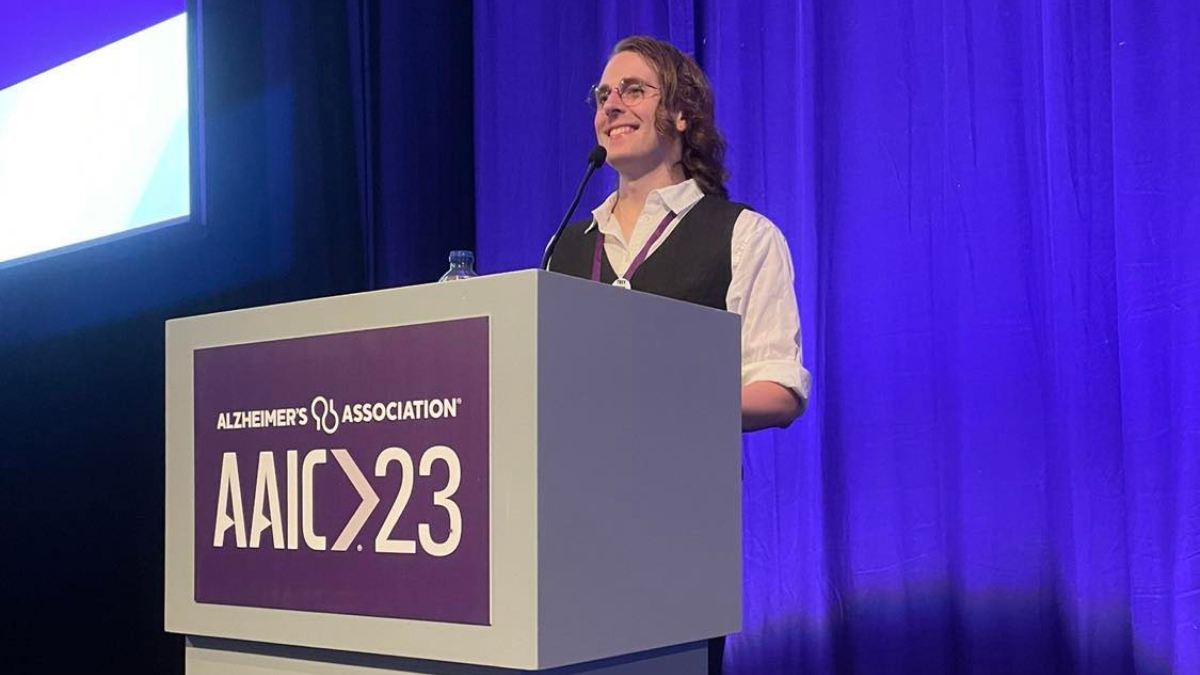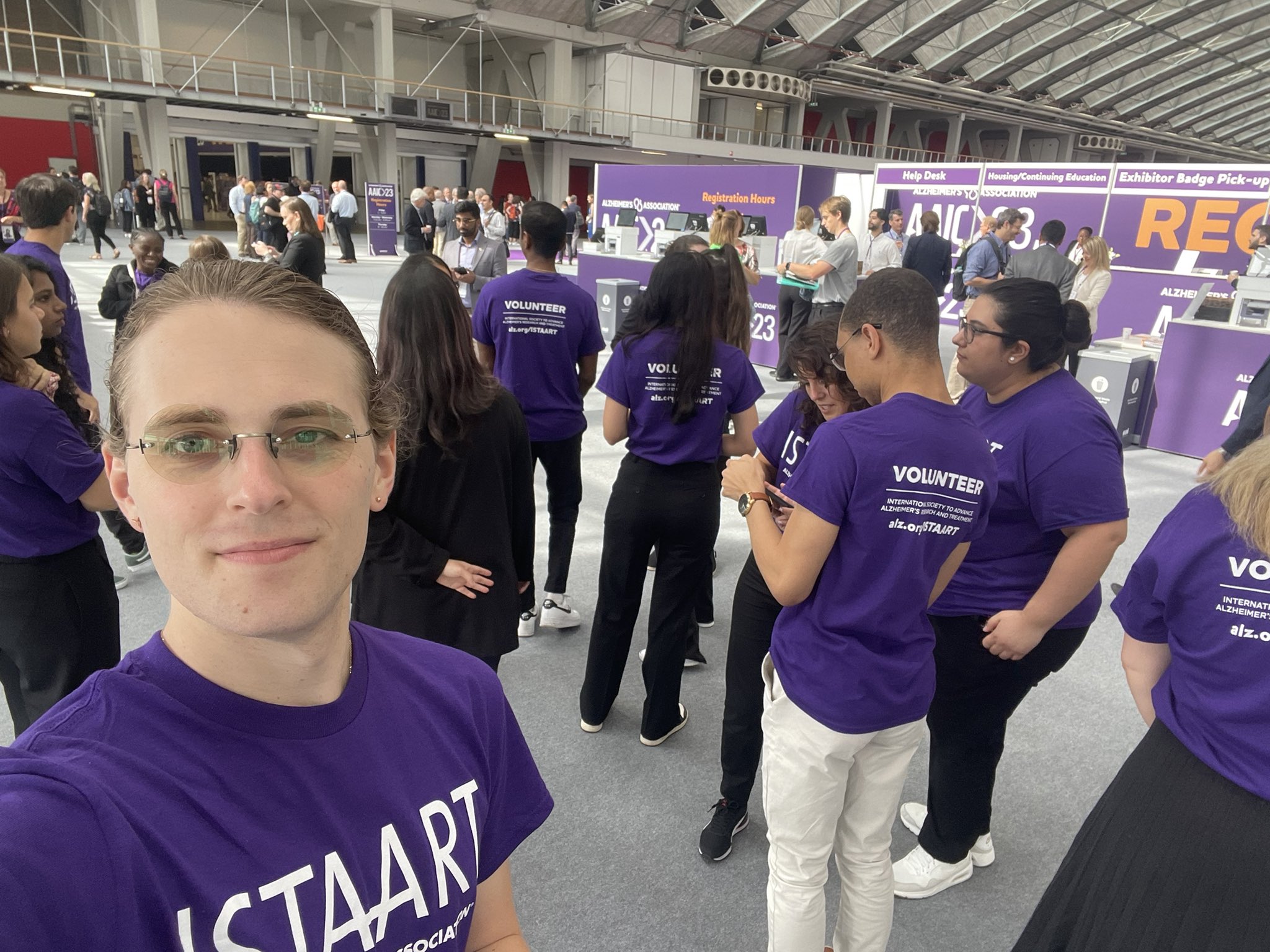An AAIC Conversation with Early Career Researcher Duncan Nowling,
Graduate Student at the Medical University of South Carolina

One year ago at the 2022 Alzheimer’s Association International Conference in San Diego, we met graduate student Duncan Nowling at a poster session.
After a brief conversation, anyone could see this young researcher’s enthusiasm and fascination with the human brain. The only question was where this passion might take Duncan on a career path.
Duncan’s research focused on the idea that subjective cognitive decline may be an early indicator of cognitive decline before it is able to be measured by testing – in other words, when someone self-reports difficulty in their own memory, communication, or other cognitive skills but still performs normally in standardized cognitive testing, this may be a reflection of early changes happening in the brain that just aren’t captured yet due to limitations in available testing.
Now, one year later, we caught up with Duncan once again, this time via Zoom from the
2023 Alzheimer’s Association International Conference in Amsterdam, the Netherlands. And it turns out that Duncan is making an even bigger impact, both through research and beyond the laboratory.
Interview conducted by Taylor Wilson, an Alzheimer’s Association staff research champion for SC, NC & GA.
RESEARCH CHAMPION (RC):
We had a conversation a year ago about where you wanted to go with your research and your career. Since then, things really took off for you. You came to the Association’s State Advocacy Day in South Carolina, you applied to be an
ISTAART Ambassador, and you came to the Rally for Treatment Access. So after we left you last year, what made you really want to get involved with the Alzheimer’s Association outside of strictly research?
DUNCAN NOWLING (DN):
I kind of felt like something was missing from the research world for me, and it is definitely something I’ve thought about even more recently: that interactive aspect of getting one-on-one contact and being able to talk to people that my work is supposed to be helping one day… It kind of felt like I was just in an office working on my computer: what am I doing for anyone?
First showing up to the State House and then at the Rally I just attended, [I met] people who were saying, “I am diagnosed with either MCI or Alzheimer’s, and I am here telling you we need as many people as possible to know about this and fight for it, because I want those last few years with my family. I want as many possible years as I can get before it wipes everything away.”
RC: I understand. That urgency, that “why,” is what drives the Association’s work every day. In addition to getting involved with the Alzheimer’s Association, you’ve stayed in this particular research field as well. So what you are currently working on?
DN: My work is in the neuroimaging field, so using MRIs to look at scans of people’s brains, focusing on early or preclinical stages. This would be before people would have symptoms that you could detect in a clinic… we are looking at people who are saying, “I am having these issues, but when I am tested, I am fine.” So I am using MRI tools to look at brain activity in this subjective cognitive decline: how brain activity is changing, and how relationships between different parts in the brain change.
There’s a very specific organization [in the brain] and it is set up to be as efficient as possible. I’m looking to see if there are changes in that organization in these people that may actually be a good early warning sign. [i.e.] “Hey we should keep an eye on you. This could be indicating you’re more at risk for decline. Maybe you’re a good patient for preventative treatment.”
I am scheduled to defend my research for my Ph.D. on August 25th, so when I get back from Amsterdam, I will spend one month waking up, writing [all day], and going to sleep.
RC: This diagnostic research is so important, especially now in a
new era of Alzheimer’s treatment. So let’s talk about the Alzheimer’s Association International Society to Advance Alzheimer’s Research and Treatment (
ISTAART). For readers who aren’t familiar, ISTAART is a global network of scientists, clinicians and dementia professionals that collaborates across many areas of Alzheimer’s and dementia research. And the ISTAART Ambassador Program connects early career researchers like you with year-round professional development and networking opportunities, both here at AAIC and at other scientific meetings. Why did you decide to apply to the Ambassador Program?
DN: When we met [last year] in San Diego and talked about Alzheimer’s Association in general, that’s when I decided to go down to the ISTAART booth and sign up to be a member.
Then I heard about the Alzheimer’s Association State Advocacy Day going on to try and convince more representatives to support the strategic plan — which I just saw got passed, so I am so excited to hear that! I came down to State House Day, and I was trying to do something I had never done before. There was a mix up, so I met with another representative… and he was like, “I am on board.” I felt like, “OH, this is doing something. This is change.” (Learn more about
getting involved with advocacy in South Carolina.)
It was something I had never felt from my research before. A lot of times the research can feel like it’s just for you. You go for years collecting data, processing it, trying to figure out what it means. And maybe you haven’t published anything yet. So really, you have all this info that could impact millions of people and it’s all up here and in a computer. And you start to feel disconnected.
So having that experience [as an advocate] was an eye-opener. And then you mentioned the ISTAART Ambassador program and you connected me to [the program coordinator]. It was talking to her that convinced me to go ahead and submit the application.
(Duncan attended AAIC 2023 as a member of the ISTAART Ambassador program and had the opportunity to co-moderate a session for the very first time.)
 RC:
RC: And then you attended our Rally for Treatment Access and brought people with you, which is so great! So, we talk a lot about trying to connect the community with research to help people to feel more comfortable with the idea of clinical trials and getting more involved. But it sounds like we also need to look at the benefit of connecting the researcher to the community.
DN: Oh, one hundred percent. Being able to interact with [the community] can often drive decisions making about research as well. It’s not just, “We just need to understand the disease.” It is more about what are these people facing. What are they hoping for? What do they want out of this? And knowing what they are going through, you have a better context for your outcomes and whether this is the right path to follow. Is this going to have the most impact on improving lives? And all of these considerations we have to make, not just as medical doctors, but also as Ph.Ds.
From this brief exchange with Duncan, it is evident that there is a passion that can be ignited in researchers when they the opportunity to engage on different levels with those they are working so hard to support and help.
Data is never as warm as a handshake. And the Alzheimer’s Association’s work to bring research into the community and connect early career researchers to their field is already making a difference in several pillars of the Association’s mission. Duncan has become an advocate. Other researchers have created teams for
Walk to End Alzheimer’s events in their communities.
As we enter a new era of Alzheimer’s treatments, these connections are more important than ever before. Our best wishes to Duncan! We are excited to see where a newly-minted Dr. Nowling will take Alzheimer’s and dementia research in the future.
About the Alzheimer’s Association International Conference (AAIC)
AAIC is the largest and most influential international meeting dedicated to advancing dementia science. Each year, AAIC convenes the world’s leading basic science and clinical researchers, next-generation investigators, clinicians and the care research community to share research discoveries that’ll lead to methods of prevention and treatment and improvements in the diagnosis of Alzheimer’s disease.
Read more about the highlights from AAIC23.
Alzheimer's Association
The Alzheimer's Association leads the way to end Alzheimer's and all other dementia — by accelerating global research, driving risk reduction and early detection, and maximizing quality care and support. Our vision is a world without Alzheimer's and all other dementia.™ For more information, visit www.alz.org or call the 24/7 Helpline at 800.272.3900.